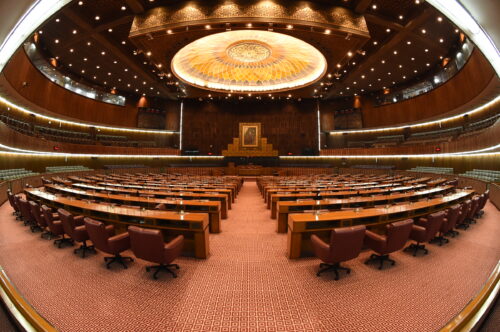By Muhammad Mohsin Iqbal
In the intricate fabric of parliamentary governance, the position of Deputy Speaker holds a pivotal role, acting as a bridge between the government and the opposition, ensuring the smooth functioning of legislative proceedings. In Pakistan, the Deputy Speaker of the National Assembly embodies this crucial function, embodying the principles of democracy and inclusivity.
One of the notable milestones in the history of the Deputy Speaker in Pakistan occurred with the establishment of the first Constituent Assembly in 1947. Honorable figures such as Maulvi Tamizuddin Khan and Chaudhry Muhammad Afzal Cheema played instrumental roles as Deputy Speakers during this formative period, laying the groundwork for parliamentary democracy in the nascent state.
Subsequently, as Pakistan transitioned through different phases of governance, the role of the Deputy Speaker continued to evolve, adapting to the changing dynamics of politics and society. From the tumultuous years of martial law to the restoration of democratic rule, Deputy Speakers have remained steadfast in their commitment to upholding the principles of democracy, rule of law, and parliamentary sovereignty.
In recent decades, Pakistan has witnessed a renewed emphasis on democratic governance, marked by a series of constitutional reforms aimed at enhancing parliamentary oversight and accountability.
Against this backdrop, Deputy Speakers such as Syed Zafar Ali Shah, Mr. Faisal Karim Kundi, Mr. Murtaza Javed Abbasi, Mr. Muhammad Qasim Khan Suri and Mr. Zahid Akram Durrani have played pivotal roles in steering legislative agendas, promoting consensus-building, and upholding parliamentary decorum.
Today, the Deputy Speaker of the National Assembly continues to occupy a central position in Pakistan’s democratic framework, embodying the values of impartiality, integrity, and inclusivity. As the nation confronts new challenges and opportunities on its path towards progress and development, the role of the Deputy Speaker remains integral in fostering a culture of dialogue, cooperation, and democratic governance within the halls of parliament.
Furthermore, the Deputy Speaker of the National Assembly of Pakistan serves as a custodian of parliamentary democracy, representing the collective aspirations of the people. Through their unwavering dedication to upholding democratic principles and parliamentary traditions, they contribute to the vitality and resilience of Pakistan’s democratic institutions. As Pakistan marches forward on its democratic journey, the role of the Deputy Speaker stands as a testament to the enduring strength of parliamentary democracy in shaping the nation’s future.
Below is a summary of the votes and dates for each Deputy Speaker:
• Maulvi Tamizuddin Khan: Unopposed Deputy President of the Constituent Assembly in 23 February 1948 till 13 December 1948.
• Mr. M.H. Gazder: Unopposed Deputy President of the Constituent Assembly in 28 March 1953 till 24 October 1954.
• Mr. C.E. Gibbon: Unopposed Deputy Speaker on August 12, 1955 till 7 October 1958.
• Chaudhry Muhammad Afzal Cheema: Elected Senior Deputy Speaker with 75 votes against Mr. Hassan Akhtar Raja, who received 74 votes on 11 June 1962 till January 22, 1965.
• Mr. Abul Quasem (Other): Unopposed on 11 June 1962 till January 12, 1965.
• Mr. Fazal Elahi Chauhdary (Senior Deputy-Speaker): Unopposed on January 12, 1965 till March 25,1969.
• Mr. A. T. M. Abdul Mateen (other): Unopposed Speaker on Unopposed on January 12, 1965 till March 25,1969.
• Mr. Mohammad Haneef Khan: Unopposed Deputy Speaker on August 15, 1972 till August 10,1973.
• Ms. Ashraf Khatoon Abbasi: Elected Deputy Speaker with 98 votes against Ms. Jennifer Jahanzeba Qazi Musa, who received 26 votes on 11 August 1973 till January 10, 1977.
• Mr. Abdul Fateh: Unopposed Deputy Speaker on March 27, 1977 till July 5,1977.
• Mr. Wazir Ahmed Jogezai: Unopposed Deputy Speaker on March 23, 1985 till May 29,1988.
• Ms. Ashraf Khatoon Abbasi (Second Tenure): Elected Deputy Speaker on December 3, 1988, with 133 votes against Haji Sardar Gul Khatab, who received 65 votes till August 6, 1990.
• Haji M. Nawaz Khokhar: Elected Deputy Speaker on November 4, 1990, with 143 votes against Mr. Fateh Muhammad M. Hassani, who received 47 votes till 18 July 1993.
• Syed Zafar Ali Shah: Elected Deputy Speaker on October 17, 1993, with 115 votes against Haji Muhammad Nawaz Khokhar, who received 81 votes till November 5, 1996.
• Chaudhry Muhammad Jaffar Iqbal: Unopposed Deputy Speaker on February 16, 1997 till August 20, 2001
• Sardar Muhammad Yaqoob: Elected Deputy Speaker on November 19, 2002, with 163 votes against Hafiz Hussain Ahmed (82 votes) and Mr. Nabeel Gabol (69 votes) till November 15, 2007.
• Mr. Faisal Karim Kundi: Elected Deputy Speaker on March 19, 2008, with 246 votes against Ms. Khush Bakht Shujaat, who received 68 votes till March 16, 2013
• Mr. Murtaza Javed Abbasi: Elected Deputy Speaker on June 3, 2013, with 258 votes against Ms. Munazza Hassan (31 votes) and Ms. Kishwer Zahra (23 votes) till May 31, 2018.
• Mr. Muhammad Qasim Khan Suri: Elected Deputy Speaker on August 15, 2018, with 183 votes against Mr. Asad Mahmood, who received 144 votes till April 16, 2022.
• Mr. Zahid Akram Durrani: Unopposed Deputy Speaker on April 21, 2022 till August 10, 2023.




